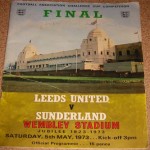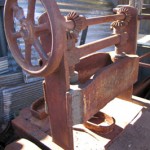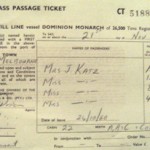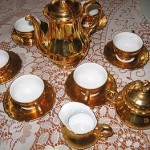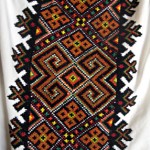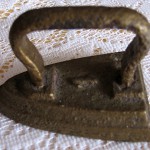Assyrian
Habbaniyah, Iraq
Baghdad, Iraq on 25 May 1964
Sydney on 27 May 1964
Rented terrace house with family in Paddington, Sydney.
Printing cards and leaflets for Kookaburra Printing in Paddington.
Quality control work for Comalco in Yennora and Crown Corning in Liverpool; own poultry farm in SW Sydney.
My name is Sophia Kanna and I was born in Baghdad in Iraq on 1 November 1933. I lived in Habbaniyah which was about 90 kilometres west of Baghdad and is now a town of about 20,000 people. That area of Iraq had many British servicemen during World War Two where an air force base was operating and, after the war, many remained to work in the petroleum industry. The British base was withdrawn in 1959.
During the war my father worked with the Royal Air Force in Iraq. My mother, also an Assyrian, came originally from Russia. I had three brothers who made up our family, my eldest brother being born in Moscow. We were all fortunate in receiving good educations. In Iraq at that time, education was easy to obtain for the more affluent, although in private schools.
I am proudly an Assyrian. We are a race of people who had been living in Iraq long before the Muslims came and we are Christian. Assyrians are one of the oldest cultures in the world and have existed since at least 2,400 BC. We lived predominantly in the area near the Tigris and Euphrates rivers in Iraq and were one of the earliest people to adopt Christianity in 33 AD. Assyrians can be found now in many other parts of the world.
The Assyrians had no official country and lived under the government of the Iraqis. We had our own churches but no schools in which to teach our children the Assyrian language. The churches did however conduct language and culture classes for a few weeks in summer. We all spoke Assyrian at home and of course Arabic, which was Iraq’s first language. Many also spoke English because of their association with the British who were based there. We had a relatively peaceful time under King Faisal but when he was assassinated in 1958 things changed for us. [Later], when Saddam Hussein came into power, changes gradually occurred. Life subsequently became intolerable for the Assyrians.
Previously we had been financially quite well off and many [Assyrians] lived in beautiful, brick houses built by the petroleum company. We were not forced to wear Muslim clothing but we were however restricted in that we were not allowed to swim in the local swimming pools.
I met my husband Youaw in Kirkuk in northern Iraq. I had gone there for my mother to have an operation and he was there visiting with his sister. We were attracted to each other and married in 1954. Over the next few years we had three children and, later, we decided to migrate to Australia. My mother-in-law gave me this blanket as something I may need when we got [there]. It was made in Iraq by the Fatha Pasha Company [and] had passed through the family.
My husband, while reading the Iraqi Times, saw a position advertised in Australia. He applied for the job and was accepted as a stock clerk at Golden Fleece in Matraville but had initially to go to Sydney alone. Five months later we followed. I was very excited at the prospect of leaving Iraq as things were getting quite difficult for us. The thought of moving to another country where we could hopefully be free was utmost on my mind and the excitement built up over the last weeks. I wanted to leave Iraq and be with my husband. All I could think of on leaving was, “Thank God I’m going”.
The journey over was somewhat of a nightmare. We flew all night; firstly from Iraq to Iran on Iranian Airways, then on Qantas from Iran to Australia [via] Bangkok, where we stopped to refuel. My six month old son was teething and cried all night but the other two children, who were then aged seven and four, played on the floor with books. It did not seem to worry them. I was quite ill and had only juice and water during the flight.
I was so pleased when finally we reached Sydney Airport, just before [Orthodox] Easter on 27 May 1964. On remembering back, my first impression of Australia was that the school children all wore school uniforms. I had not expected that as I had thought that the American way of no uniforms would prevail here too. It was a most pleasant surprise. I felt that it made everyone equal.
Youaw had found us a rented terrace house in Paddington [in Sydney's eastern suburbs]. I soon made friends with my neighbour who was Maltese and she took me to the school to enrol my daughters. The school was Catholic and because we were Church of the East they could not accept them and we had to compromise by sending them to Paddington Public School. My son was six months old at the time. A neighbour’s daughter took the girls to and from school, and for that I paid her one shilling a week.
It was not easy for our family to survive on one wage and soon it became necessary for me to look for work to augment our income. It was difficult as our rent was £12 and my wage when I started at Kookaburra Printing [in] Paddington was £11. My husband bought everything else. My neighbour showed me how to obtain a Grace Bros card with which to buy good quality clothes for the children but often I purchased second hand clothes for myself. Our [dining] tables in the beginning were tomato boxes. I turned them upside down and covered them with a cloth to disguise their ugliness. Our washing was done by boiling a pot of water and hand washing and wringing the clothes and linen.
I remained at Kookaburra Printing for seven years until they moved to Botany and it became too difficult for me to travel there. As well, the hours were not convenient for the family. We had moved to Darlinghurst as a consequence of the job shifting but even so it was still inconvenient. We then moved to Fairfield as we wanted to purchase our own home and it was necessary to move to the outer suburbs as housing was much cheaper there. The house cost us $12,000.
I then went to work at Comalco which was an aluminium factory in Yennora. The position at Comalco was that of quality control and my job entailed checking drink cans for leaks. I remained there for five years. It was a good job but we were looking for something more.
My husband had been working [for the] State Planning [Authority of NSW] in Sydney and remarked to a workmate that he would like to start his own business. The friend replied that poultry farming would be the way to go. That was in about 1972. We moved to this property in 1973. The fact that we had absolutely no knowledge of farming of any type did not deter us. In fact, I had never before seen a farm in my life, let alone run one.
We put our home in Fairfield up for sale and put a deposit on the farm. It had six acres, an old house and 5,000 chickens which were caged, not free range. The people from whom we were purchasing the property showed us how to collect and clean the eggs and send them to the Egg Board.
I learnt all about chicken [and] egg farming and keeping the chickens free from disease. We learnt that the sheds had to be separated in case one lot of chickens became ill, then the disease in that shed could be quarantined from the other. After some confusion over raising a loan, we finally moved in and the farm was ours. We were young and healthy and wanted to work. We wanted to stand on our own feet and not rely on anyone else for our livelihood.
There were just the two of us to start with working on the farm. The children of course were too young and were in school. We survived after a lot of hard work. We increased the number of chickens from 5,000 to 10,000 but I remained in work as a precaution against anything untoward happening. We needed something to fall back on. I went to Crown Corning in Liverpool which produced many types of glassware and worked in quality control just as I had done at Comalco. It was very hard on us as a family as the hours were long and tiring and finally, in about 1989, I chose to retire from Crown Corning.
From 1974 I began teaching Assyrian language to people of all ages on a Saturday. Fairfield Primary School allowed us to use their premises. We teach the new migrants our language but we also teach them Australian culture, various means of seeking an education and how to live and integrate into the Australian way of life. I retired from teaching after 10 years, in 1984.
We are the first Assyrian family to come to this area and in the following years many more have gravitated here as well. Many of them have been sponsored by us and are looked after in regards to housing and jobs until they get on their feet. In the ’70s my husband was instrumental in starting the Nineveh Club which is the Assyrian Club. It is in Smithfield Road, Edensor Park and is a popular meeting place for Assyrians and others. We now have the largest Assyrian community in Australia and have our own churches and clubs.
My Belongings, as you can see, are the blanket from my mother-in-law and two dolls, a male and a female.
This blanket is one of the few possessions that I brought to Australia from Iraq and is naturally very special to me. It is woven of pure sheep’s wool and is very warm, although quite prickly, and for that reason it is usually encased in a doona cover whilst in use. It had been used in my father-in-law’s house and he loved it because it was thick and warm. When he came to Australia and slept at my house, I put it on his bed. It is a warm memory of him.
A friend made [the dolls] for me a couple of years ago – she is an Assyrian woman who had arrived as a refugee – and I treasure them so much. In order to make money she commenced making our traditional dolls. They were well sought out by the Assyrian community.
The dolls’ clothes are typical old Assyrian clothing that would be worn to a wedding or other special occasion. The design is typical of Northern Iraq. The beautiful fabrics draped over their arms are shawls encrusted with ornamentation. It is a tradition to carry these scarves and they replace a handbag as something to occupy one’s hands. The dolls typify our tradition and one should never be ashamed of their tradition. The dolls are very important to me as a reminder of my former homeland and eventually they will be inherited by my children.
I have never been back to Iraq nor do I wish to. A hundred times a day I thank God for bringing us here. My husband’s mother and father died here as did his 91 year old grandmother. [They] moved here soon after we did for the same reasons – peace and freedom. I have raised and educated my three children here and will stay here. I love this country and the peace and happiness it has given my family.


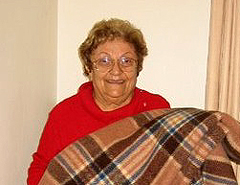



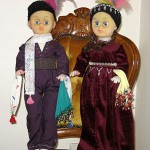
!["It had been used in my father-in-law’s house [in Iraq] and he loved it because it was thick and warm. When he came to Australia and slept at my house, I put it on his bed. It is a warm memory of him."](../../../cms/wp-content/uploads/2008/10/blanket-150x150.jpg)
